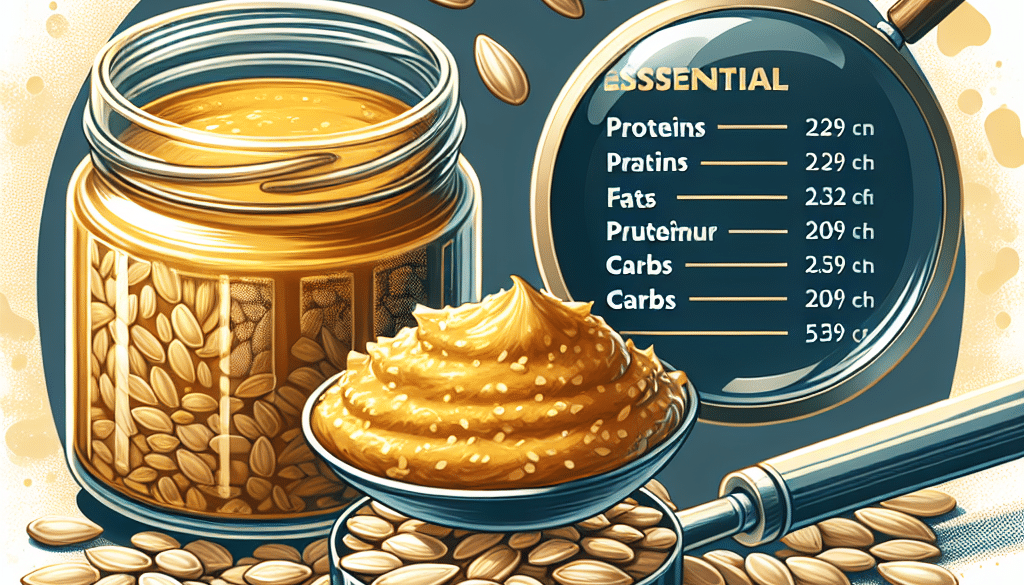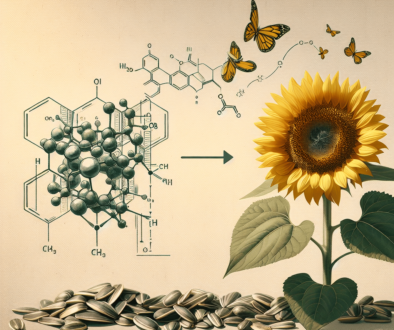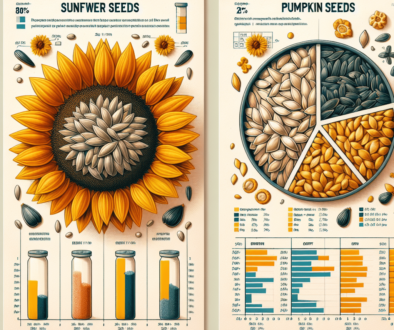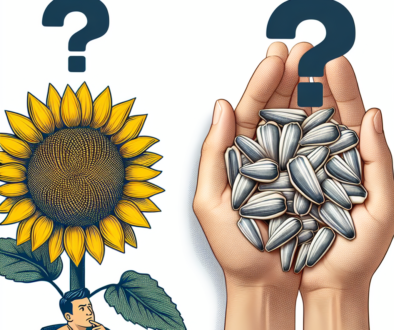Exploring the Protein Content of Sunflower Butter
Table of Contents
- Sunflower Butter: A Deep Dive into Its Protein Content
- Understanding Sunflower Butter
- Nutritional Profile of Sunflower Butter
- Protein Content in Sunflower Butter
- Benefits of Protein in Sunflower Butter
- Comparison with Other Nut and Seed Butters
- Incorporating Sunflower Butter into Your Diet
- Case Studies and Research on Sunflower Butter
- Consumer Trends and Market Growth
- Challenges and Considerations
- Conclusion: The Protein Power of Sunflower Butter
- Discover ETprotein’s High-Quality Protein Products
Sunflower Butter: A Deep Dive into Its Protein Content
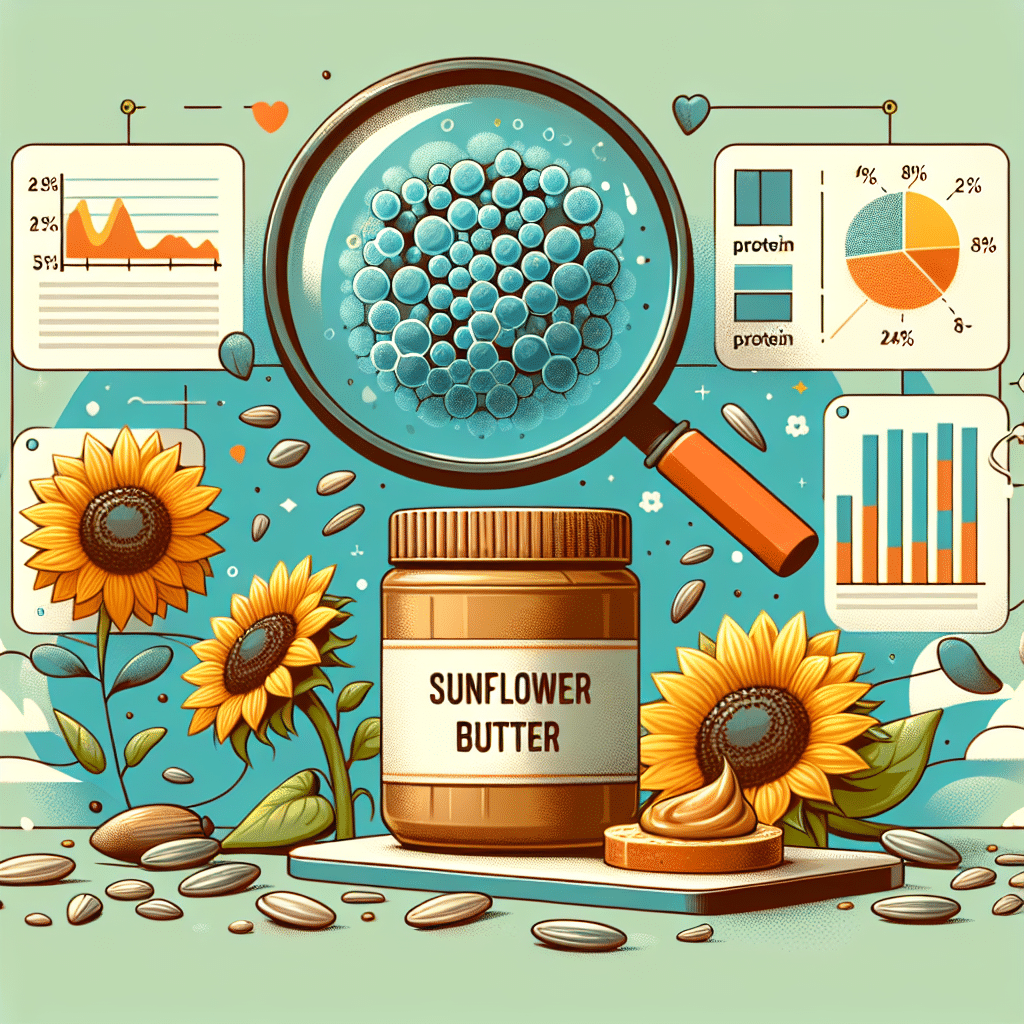
As the world becomes increasingly health-conscious, the demand for nutritious and plant-based alternatives to traditional foods has skyrocketed. Among these, sunflower butter has emerged as a popular choice for those seeking a delicious and protein-rich spread. This article explores the protein content of sunflower butter, its health benefits, and how it compares to other nut and seed butters.
Understanding Sunflower Butter
Sunflower butter, made from the seeds of the sunflower plant, is a creamy spread that has gained popularity due to its unique flavor and health benefits. Unlike peanut butter or almond butter, sunflower butter is free from common allergens, making it a safe option for those with nut allergies. But what about its protein content? Let’s delve into the nutritional profile of sunflower butter.
Nutritional Profile of Sunflower Butter
Sunflower butter is not only rich in protein but also contains essential vitamins and minerals. A typical serving of sunflower butter provides:
- Protein
- Healthy fats, including monounsaturated and polyunsaturated fats
- Fiber
- Vitamin E
- Magnesium
- Phosphorus
- Zinc
- Iron
These nutrients contribute to the overall health benefits of sunflower butter, making it a nutritious addition to any diet.
Protein Content in Sunflower Butter
When it comes to protein, sunflower butter is a powerhouse. A two-tablespoon serving typically contains about 5-7 grams of protein, depending on the brand and preparation method. This makes it a comparable protein source to other popular nut butters.
Benefits of Protein in Sunflower Butter
Protein is a crucial macronutrient necessary for building and repairing tissues, making enzymes and hormones, and supporting immune function. The protein in sunflower butter can help:
- Build and maintain muscle mass
- Keep you feeling full and satisfied
- Stabilize blood sugar levels
- Support a healthy metabolism
These benefits make sunflower butter an excellent choice for athletes, those looking to manage their weight, and anyone interested in maintaining a balanced diet.
Comparison with Other Nut and Seed Butters
When compared to other nut and seed butters, sunflower butter holds its own in terms of protein content. Here’s how it stacks up against some popular alternatives:
- Peanut butter: Approximately 8 grams of protein per two-tablespoon serving
- Almond butter: About 6-7 grams of protein per two-tablespoon serving
- Tahini (sesame seed butter): Roughly 5 grams of protein per two-tablespoon serving
While peanut butter may have a slight edge in protein, sunflower butter is a more suitable option for those with nut allergies and offers a different nutrient profile.
Incorporating Sunflower Butter into Your Diet
There are numerous ways to include sunflower butter in your diet to take advantage of its protein content. Some ideas include:
- Spreading it on toast or crackers
- Adding it to smoothies or shakes
- Using it as a base for sauces or dressings
- Incorporating it into baked goods
- Creating homemade energy bars or protein balls
With its versatility and delicious taste, sunflower butter can easily become a staple in your kitchen.
Case Studies and Research on Sunflower Butter
Several studies have highlighted the benefits of sunflower seeds and their derivatives. For instance, research has shown that the consumption of sunflower seeds is associated with a reduced risk of chronic diseases due to their antioxidant content. While specific studies on sunflower butter are less common, its similar nutritional profile suggests comparable health benefits.
Consumer Trends and Market Growth
The market for sunflower butter has seen significant growth in recent years, driven by consumer demand for healthy and allergen-free food options. This trend is supported by statistics showing an increase in the sales of plant-based spreads and the overall growth of the health food sector.
Challenges and Considerations
Despite its benefits, there are some considerations to keep in mind when consuming sunflower butter. These include:
- Calorie content: Sunflower butter is calorie-dense, so moderation is key.
- Added sugars: Some brands may add sugar, so it’s important to read labels carefully.
- Quality of ingredients: Opt for sunflower butter made with minimal and high-quality ingredients.
Being mindful of these factors will help you make the most of sunflower butter’s nutritional benefits.
Conclusion: The Protein Power of Sunflower Butter
Sunflower butter is a nutritious and protein-rich spread that offers a host of health benefits. Its protein content is on par with other nut and seed butters, making it a valuable addition to a balanced diet, especially for those with nut allergies. By incorporating sunflower butter into your meals and snacks, you can enjoy its delicious taste while fueling your body with essential nutrients.
Discover ETprotein’s High-Quality Protein Products
If you’re looking to enhance your diet with additional protein sources, consider exploring ETprotein’s range of organic bulk vegan protein and plant proteins. Their products, including sunflower seed protein, are known for their neutral taste and non-GMO, allergen-free attributes, making them an excellent choice for various applications.
About ETprotein:
ETprotein, a reputable protein Chinese factory manufacturer and supplier, is renowned for producing, stocking, exporting, and delivering the highest quality organic bulk vegan protein and plant proteins. They include Organic rice protein, clear rice protein, pea protein, clear pea protein, pumpkin seed protein, sunflower seed protein, mung bean protein, etc. Their offerings, characterized by a neutral taste, non-GMO, allergen-free attributes, cater to a diverse range of industries. They serve nutraceutical, pharmaceutical, cosmeceutical, veterinary, as well as food and beverage finished product distributors, traders, and manufacturers across Europe, USA, Canada, Australia, Thailand, Japan, Korea, Brazil, and Chile, among others. ETprotein specialization includes exporting and delivering tailor-made protein powder and finished nutritional supplements. Their extensive product range covers sectors like Food and Beverage, Sports Nutrition, Weight Management, Dietary Supplements, Health and Wellness Products, and Infant Formula, ensuring comprehensive solutions to meet all your protein needs. As a trusted company by leading global food and beverage brands and Fortune 500 companies, ETprotein reinforces China’s reputation in the global arena. For more information or to sample their products, please contact them and email sales(at)ETprotein.com today.

